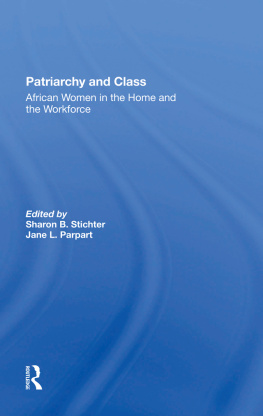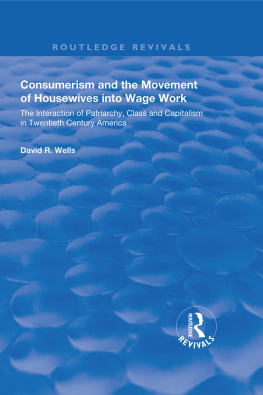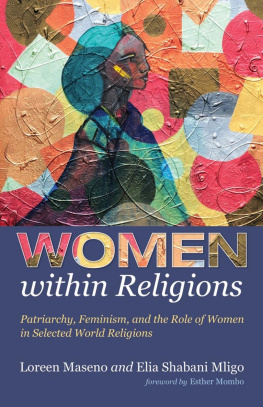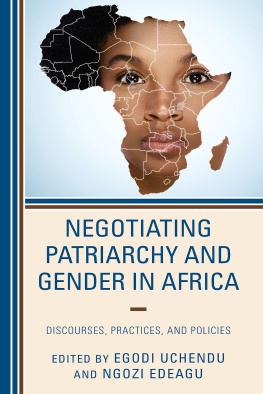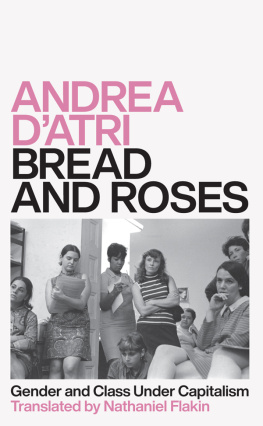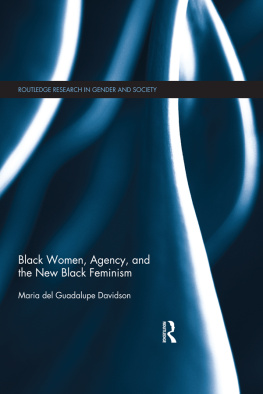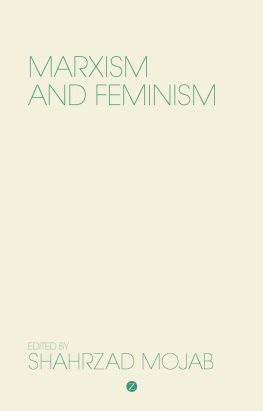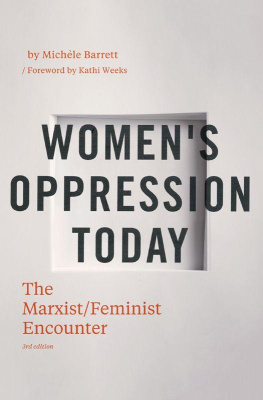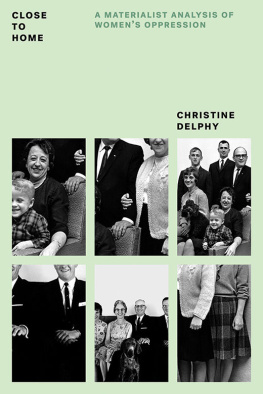Patriarchy and Class
African Modernization and Development Series
Paul Lovejoy , Series Editor
Patriarchy and Class: African Women in the Home and the Workforce,
edited by Sharon B. Stichter and Jane L. Parpart
The Precarious Balance: State and Society in Africa,
edited by Donald Rothchild and Naomi Chazan
African Population and Capitalism: Historical Perspectives,
edited by Dennis D. Cordell and Joel W. Gregory
Southern African Labor Migration and the South African Gold Mines:
1960-1984, Jonathan Crush, Alan Jeeves, and David Yudelman
African Cities in Crisis: Managing Rapid Urban Growth,
edited by Richard Stren and Rodney White
Patriarchy and Class
African Women in the Home and the Workforce
Edited by
Sharon B. Stichter
and Jane L. Parpart
First published 1988 by Westview Press
Published 2019 by Routledge
52 Vanderbilt Avenue, New York, NY 10017
2 Park Square, Milton Park, Abingdon, Oxon OX14 4RN
Routledge is an imprint of the Taylor & Francis Group, an informa business
Copyright 1988 by Taylor & Francis
All rights reserved. No part of this book may be reprinted or reproduced or utilised in any form or by any electronic, mechanical, or other means, now known or hereafter invented, including photocopying and recording, or in any information storage or retrieval system, without permission in writing from the publishers.
Notice:
Product or corporate names may be trademarks or registered trademarks, and are used only for identification and explanation without intent to infringe.
Library of Congress Cataloging-in-Publication Data
Patriarchy and class.
(African modernization and development series)
Includes index.
1. WomenAfrica, Sub-SaharanSocial conditions.
2. Sex roleAfrica, Sub-Saharan. 3. Patriarchy
Africa, Sub-Saharan. 4. Africa, Sub-SaharanSocial
conditions1960- . I. Stichter, Sharon B.
II. Parpart, Jane L. III. Series.
HQ1787.P29 1988 305.4'0967 88-219
ISBN 13: 978-0-367-28240-0 (hbk)
This book has a long history and many debts. The idea for a collection or special issue on marxist-feminist thought as applied to Africa dates back to the 1983 Boston meetings of the African Studies Association, when the editors organized a panel with a number of the book's contributors, including Luise White, Nancy Folbre, and Jeanne Henn. The panel aroused considerable interest and raised the possibility of a special journal issue on the subject. But the decision to produce a collection only crystallized the following spring at the annual meetings of the Canadian Association of African Studies in Montreal. At the time, Paul Lovejoy had just become the editor of Sage's series on African Modernization and Development, and he enthusiastically endorsed the suggestion that the proposed collection would be appropriate for the series. The authors gratefully acknowledge his support and help throughout the project, especially during the series' smooth transition from Sage to Westview Press. His thoughtful comments facilitated revisions and made Patriarchy and Class a better book.
Above all, we wish to thank our contributors, who have produced fine original essays addressing the book's major themes and have willingly responded to suggestions for revision. Earlier versions of some of these essays appeared in the publications of the African Studies Center at Boston University and have consequently benefitted from the careful editing of its production editor, Jean Hay.
We also wish to thank the staff at Westview Press, particularly Sally Furgeson and Dean Birkenkamp, the external reviewers for their insightful comments, and our typists Mary Wyman and Becky Grant, both of the Dalhousie University History Department. We also wish to thank Dalhousie's faculty of graduate studies and CIDA's public participation programme for financial support towards manuscript preparation costs. The book could not have been completed without them. Finally, our grateful thanks to our husbands, Joe Stichter and Tim Shaw, without whose patience, loving support, and endurance through countless hours of restaurant conversations this book could surely have never been completed.
Sharon B. Stichter
Jane L. Parpart
Introduction: Towards a Materialist Perspective on African Women
Sharon B. Stichter and Jane L. Parpart
The great debate between feminism and marxism, so central to the development of contemporary feminist theory, seems in many ways to have passed African studies by. Marxist analyses focusing on modes of production, capital accumulation and class formation in Africa have abounded, yet most of these have paid scant attention to feminist concerns. On the other hand, empirical studies of the position of African women have flourished, yet the implications of these for a marxist-feminist approach have not been drawn out.
The present volume argues for the applicability of a materialist mode of production analysis to the situation of women in Africa. Although the contributors by no means agree on precise theoretical formulations, nor even on the use of the term "mode of production," they are united in addressing themselves in one way or another to fundamental problems of conceptualization relevant to marxism-feminism. Some of the chapters are couched in a specifically theoretical vein, while others have as their primary aim the interpreting of particular experiences of women in concrete African social formations. This introduction will briefly review some of the intellectual background and current theoretical dilemmas of marxism-feminism, setting the context for the main themes and contributions of the various chapters.
A.
The feminist challenge to marxism arose from complex roots. Analytically, it seized on the glaring fact that the subordination of women did not seem to be in any sense coterminous with capitalism. Not only had especially oppressive forms of patriarchy flourished in precapitalist societies; the situation in many contemporary socialist societies indicated that the abolition of capitalism would not necessarily lead to patriarchy's demise.
Conventional Marxists had always approached the "Woman Question" as a function of women's position in the system of production. Early marxist analyses of women in capitalist society focussed on women's exclusion from wage work and their confinement to the "non-productive" sphere of housework as the key explanatory factors. The capitalist system, with its emphasis on private property and the commoditization of waged labor, was seen as the cause of this sexual division of labor. Engels, in The Origin of the Family, Private Property and the State, argues that women's subordination is a form of oppression resulting from the institution of class society and maintained because it serves the interests of capital. Male dominance, according to Engels, was inextricably bound up with capitalism and the ruling class, and would disappear with the advent of a socialist revolution and the wholesale entry of women into the waged labor market (Engels 1972).
In contrast, radical feminism, initially expressed by writers such as Shulamith Firestone (1971) and Kate Millett (1971), sought to understand women's oppression by focussing directly on sex: on male/female inequality in biological reproduction, conceived as a trans-historical fact, independent of and more important than class inequities. In Maureen Mackintosh's oftquoted words, "the characteristic relation of human reproduction is patriarchy, that is, the control of women, especially of their sexuality and fertility, by men" (1977). But the danger in this approach was biological determinism, or the reduction of sex inequality to biology (Barrett 1980, p. 13). One answer seemed to be to distinguish sex as a biological category from gender as a social one. This insight can be traced to Gayle Rubin (1975), who proposed the term "sex/gender system" to denote the "set of arrangements by which the biological raw material of human sex and procreation is shaped by human, social intervention." Rubin interpreted the sex/gender system quite non-materially; it seemed, in her account, to be almost synonymous with the kinship system.


